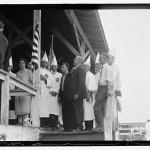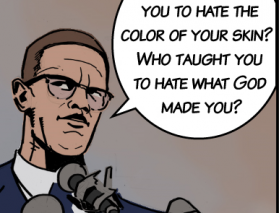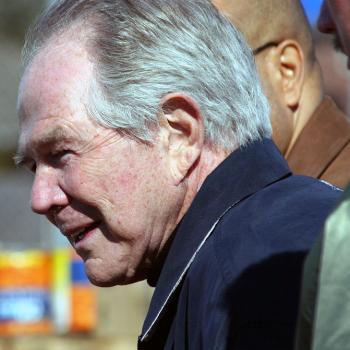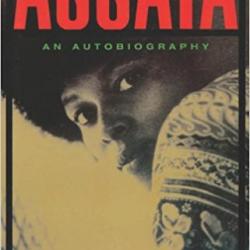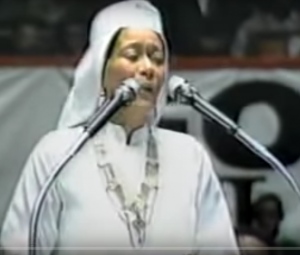 “Sister Tynetta Dynear would speak beautifully of the Muslim women’s powerful, vital contributions, of the Muslim women’s roles in our Nation’s efforts to raise the physical, mental, moral, social, and political condition of America’s black people.”’ – Malcolm X
“Sister Tynetta Dynear would speak beautifully of the Muslim women’s powerful, vital contributions, of the Muslim women’s roles in our Nation’s efforts to raise the physical, mental, moral, social, and political condition of America’s black people.”’ – Malcolm X
Who Malcolm X knew as Sister Tynetta Dynear, I knew as Tynetta Muhammad, she spoke eloquently and boldly against the oppression of black people. Her voice was capable of captivating entire audiences and reaching their soul and inspiring them to action.
As a Muslim woman, she always made it clear that she was oppressed, but the source of her oppression she clearly identified as white supremacy, “They have practiced white supremacy for over 430 years butchering our people.” She proclaimed.
Tynetta Muhammad exalted Muslim brothers to strongly adhere to their faith reminding them of their fithra,”You are Muslim brothers, whether you know it or not. If it were not so we could not have survived slavery for 436 years. We are the warriors of Muhammad and must take our proper stand!” My perception of Islam as a liberatory belief set was deeply influenced by her. Yet, as I got older I began to observe as the media portrayed Islam in a completely different light. Islam was portrayed as an inherently patriarchal religion dedicated to the oppression of women.
 The tragic stories of prominent ex-Muslims, Ayaan Hirsi Ali and Maryam Namzie are often held up as proof of the inherent misogyny of Islam and the barbarity of sharia law. Ayaarn Hisi Ali writes that,” having lived under sharia when I was a young girl in Saudi Arabia I know just what it means to be a second-class citizen.” Such narratives are then extrapolated to make widespread claims about Islam being an outdated patriarchal faith. “However, Ali did not just merely leave Islam. A close examination of her lectures and books indicate she reverted to adopt a post-racial discourse of western liberalism.
The tragic stories of prominent ex-Muslims, Ayaan Hirsi Ali and Maryam Namzie are often held up as proof of the inherent misogyny of Islam and the barbarity of sharia law. Ayaarn Hisi Ali writes that,” having lived under sharia when I was a young girl in Saudi Arabia I know just what it means to be a second-class citizen.” Such narratives are then extrapolated to make widespread claims about Islam being an outdated patriarchal faith. “However, Ali did not just merely leave Islam. A close examination of her lectures and books indicate she reverted to adopt a post-racial discourse of western liberalism.
Ayaan Hirsli Ali in her op-ed, “From Selma to Tuni: When Will We March Against the Segregation of Our Own Times”, argues that racial segregation is largely a simmering past reality with the oppression of women under sharia law being the civil rights issue of our era The question then becomes why are the narratives of Black women converts to Islam not given equal weight in the discussion of Islam and the oppression of women?
 Speaking of the inner-city life of Black Americans, Safiya Bukhari describes witnessing,” “…indecent housing, police brutality, hungry children needing to be fed, elderly people eating out of garbage cans, and hopelessness and despair everywhere.” Upon witnessing a case of police harassment against an innocent black man,Bukhari decided to join the the cause of Black Liberation and recounts,”I became a Muslim (one who submits to the will of Allah) while in the Black Panther Party.” For her belief that the world should be a better place for black people, Bukhari was sentenced to prison and placed in solitary confinement for over three years while the judicial system debated over whether to give her the electric chair.
Speaking of the inner-city life of Black Americans, Safiya Bukhari describes witnessing,” “…indecent housing, police brutality, hungry children needing to be fed, elderly people eating out of garbage cans, and hopelessness and despair everywhere.” Upon witnessing a case of police harassment against an innocent black man,Bukhari decided to join the the cause of Black Liberation and recounts,”I became a Muslim (one who submits to the will of Allah) while in the Black Panther Party.” For her belief that the world should be a better place for black people, Bukhari was sentenced to prison and placed in solitary confinement for over three years while the judicial system debated over whether to give her the electric chair.
While in solitary confinement, the same holy-texts vehemently described by Ali as patriarchal, Bukhari describes as the hadiths and Qu’ran as a source of empowerment for her while being subjected to the inhumane punishment of solitary confinement for over three years. Strong in her faith she writes ”“I grew stronger and my fear abated until finally it was gone. I could truly say with conviction, with a rock-solid belief system in place, “There’s no God but God and Muhammad, pbuh (peace be upon him), is His messenger!””
If Ayaan Hirsli Ali’s narrative of oppression in Saudi Arabia reveals the barbarity of Sharia law, why does the oppression of Safiya Bukhari under Eurocentric law not stand as evidence of the patriarchy inherent within enlightened western liberalism?
This is to not to deny the existence of women’s oppression in Saudi Arabia, it is to challenge common Western media framing that seeks to make sexism an exclusive problem of the Muslim world, while promoting a narrative of American exceptionalism in which the United States is a false beacon of light for women.
Ayaan Hirsi Ali portrays Muslim men as inherently patriarchal and claims that a commitment to Islam would increase the oppression of women. Yet, Tynetta Muhammad taught me that it was through brothers showing an unconditional and unwavering commitment to Islam that would empower us to overcome white supremacy. Yet it is Ali narratives that is promoted and Tynetta Muhammad’s that is ignored in media discussion.
It is this oppressive structure of white supremacy that Tynetta Muhammad spoke of that controls which narratives of women are listened to and sympathized for, and which are discarded and neglected. White supremacy can commodify narratives of women’s oppression.
Ayaan Hirsi Ali’s narrative can be utilized for politicians and pundits to justify foreign policy to “save Muslim women” and promote post racial discourse that obfuscates the plight of black people, meanwhile, narratives of Black women converts to Islam such as Safiya Bukhari and Tynetta Muhammad, are hardly even known garnering significantly less media attention of that of Ali.
Contrary to popular discourse, patriarchy is not confined to backward Islamist groups or Muslim governments but it also a key feature of the enlightened liberal United States. In fact, the system of patriarchy and white supremacy that pervades western society is uniquely dangerous, that it is discards entire narratives of women’s oppression and co-opting and commodifying other narratives to fit their agenda.
This means more often than not, far from being genuine attempt to counter the oppression of women, women’s rights discourse in western states often becomes simply a farce to promote western exceptionalism.
Islamophobic discourse which has castigated Islam as a uniquely patriarchal religion is predicated upon an epistemology that systematically effaces the multiple ways in which Black Muslim women have historically utilized their faith to expose and counter the sexism and racism of the United States government

